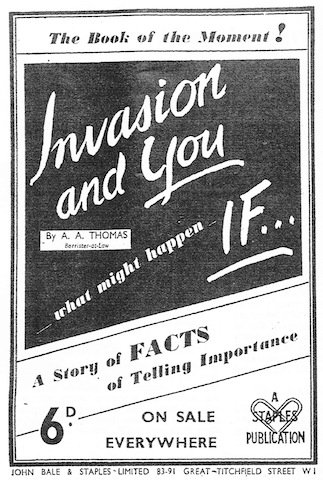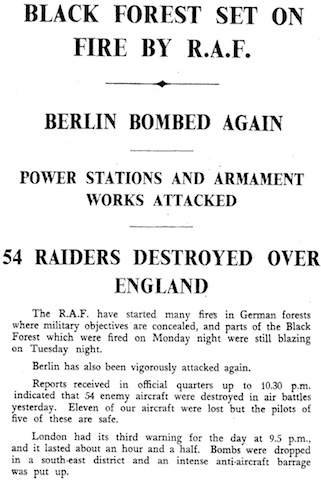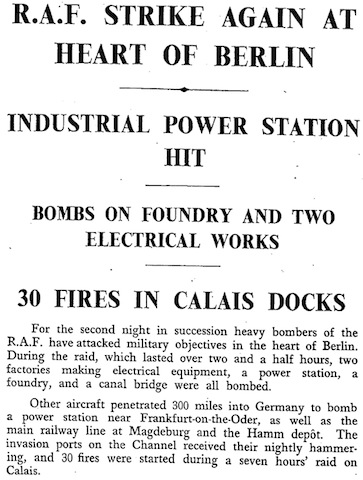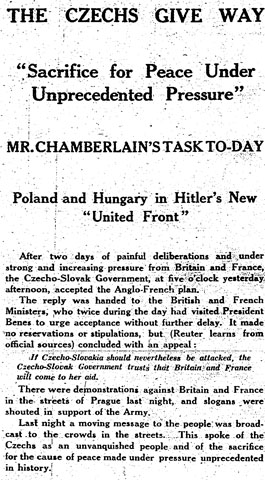
I wasn’t planning to return to The Listener quite so soon, but I can’t resist the cover of today’s issue. Such perfect symbolism. Take your pick: Britain under siege, the defence of ancient freedoms — or the wartime suppression of liberty. (Another symbolic photo appears on page 414, of the bomb crater in front of Buckingham Palace. The caption is entitled ‘Democracy of Bombs’.)
There’s certainly a theme running through this issue. The cover story is a speech broadcast by Churchill on 11 September and reprinted on page 403. The Listener has given it the title ‘Every Man to His Post’. That’s not a phrase which Churchill used, but it’s a fair summation of his message:
Therefore, we must regard the next week or so as a very important week period in our history. It ranks with the days when the Spanish Armada was approaching the Channel, and Drake was finishing his game of bowls; or when Nelson stood between us and Napoleon’s Grand Army at Boulogne. We have read all about this in the history books; but what is happening now is on a far greater scale and of far more consequence to the life and future of the world and its civilisation than these brave old days of the past.
Every man and woman will therefore prepare himself to do his duty, whatever it may be, with special pride and care.
Major-General H. Rowan-Robinson provides an illustrated overview of the Home Guard. In just three short months it has become ‘a powerful body’ which has taken its place as ‘an integral part of the defence of the United Kingdom’ (401). Rowan-Robinson reminds his readers of the ‘shocks’ which brought it into being:
First came the surrender of Holland in six days; then the mysterious failures at the Meuse bridges; then the German penetration at Sedan, the capitulation of the Belgian Army, the escape from annihilation of the British Expeditionary Force only by a narrow margin and by a miracle of martial achievement; and, finally, and worst of all, the sudden collapse of France.
Through all these events, all these astounding calamities, new methods were at work. Tanks were thundering, planes dive-bombing, parachutists falling. The rush of mechanised forces was creating panic and interrupting French control. Refugees crowding the roads furnished a protection to the invaders and paralysed the counterstrokes of the defenders.
But lessons were learned from all this: ‘the lightning rush of motorised forces could and must be brought to a halt by the blocking of roads at defiles [which] should be done by the man on the spot rather than by the army at large’; ‘parachutists must be attacked at sight before he has had time to collect his weapons [and] marshal his forces’; and ‘the inhabitant must either be evacuated in good time or must stay put’. After running through the expansion, training and equipping of the Home Guard, Rowan-Robinson casts even farther back into English history than did Churchill, evoking sturdy yeomanry of ‘the days of Crecy and Agincourt, when all sport and pleasure were discarded in the determination to win mastery by skill in the longbow […] as surely now as in those ancient days, victory will crown our efforts’ (422).

An advertisement from page 426 for a book by A. A. Thomas, Invasion and You: What Might Happen If… (London: John Bale & Staples, 1940). It certainly is a ‘book of the moment’, and at only 6d can you and your family afford not to buy it?
I was going to say that at least the gardening column is free from reminders of the war, but then I saw this question from M.D. of Peckham (422):
My air raid shelter is full of earwigs. Can you tell us of anything which will keep them away?
And the answer, of course, is chemical warfare.
![]() This work is licensed under a Creative Commons Attribution-NonCommercial-NoDerivatives 4.0 International License.
Permissions beyond the scope of this license may be available at http://airminded.org/copyright/.
This work is licensed under a Creative Commons Attribution-NonCommercial-NoDerivatives 4.0 International License.
Permissions beyond the scope of this license may be available at http://airminded.org/copyright/.





